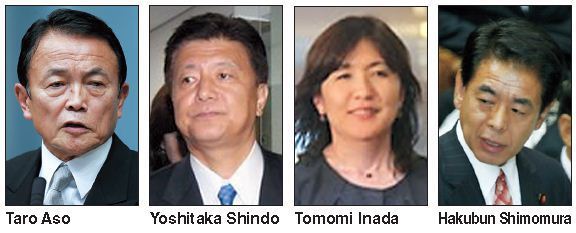일본의 아베 신조(安倍晋三) 자민당 정권이 지난주 닻을 올렸다.

자민당의 아베 총재는 지난 26일 오후 열린 특별국회에서 중의원과 참의원의 총리 선 출 투표를 거쳐 제 96대 총리에 지명됐다.
아베 총리는 자민당 정권 당시인 지난 2006년 9월 총리에 취임했다가 1년 만에 건강상의 이유로 사임했다. 한 번 퇴진한 총리가 다시 집권한 것은 요시다 시게루(吉田茂) 전 총리 이후 64년 만이다.
아베 총리는 조각에서 극우 성향의 측근 의원들을 대거 각료에 배치해 국정의 우경화가 가속할 전망이다.
작년 8월 한국의 독도 지배 강화 실태를 보겠다며 울릉도 방문을 강행했다가 김포공항에서 입국이 거부된 극우 정치인인 신도 요시타카(新藤義孝.54) 전 경제산업 성 부대신(차관)을 총무상, 이나다 도모미(稻田朋美.53) 전 자민당 부간사장을 행정 개혁담당상에 기용했다. 환경상에도 우익인 야마모토 이치타(山本一太.54) 전 외무성 부대신을 임명했다.
방위상에는 영토 문제 강경론자인 오노데라 이쓰노리(小野寺五典.52) 전 외무 부대신을 발탁했다.
아베 총리는 새 내각의 핵심인 부총리 겸 재무•금융상에 후원자인 아소 다로(麻生太郞•72) 전 총리, 관방장관에 심복인 스가 요시히데(菅義偉•64) 간사장 대행을 배치했다.
교과서 검정제도 개편 등 '교육개혁'을 주도할 문부과학상에 시모무라 하쿠분(下村博文•58) 전 관방부장관, 경제재정•경제재생 담당상에는 아마리 아키라(甘利明•63) 전 경제산업상을 임명했다.
외무상에는 당내 유력 파벌인 기시다파(전 고가파) 회장 기시다 후미오(岸田文雄•55) 전 국회대책위원장을 기용했다. .
아베 정권은 내년 1월 하순 소집하는 정기국회에서 10조 엔 규모의 2012년도 추 가경정예산을 편성하고, 5월 중 2013년도 예산안을 처리할 방침이다.
아베 총리는 가장 시급한 민생 현안인 경기 부양에 행정력을 집중해 내년 7월 예정된 참의원 선거를 승리로 이끈 뒤 교육개혁, 헌법개정 등을 본격화한다는 방침이다.
내년 1월 하순에는 미국을 방문하고, 2월 하순에는 한국의 박근혜 대통령 취임식에도 참석하는 방안을 검토 중이다.
한편, 노다 요시히코(野田佳彦) 민주당 내각은 이날 아침 열린 임시 각의에서 총사직했다. 노다 내각은 작년 9월 출범 이후 482일 만에 막을 내렸다.
New Japanese cabinet irks neighbors
New lineup includes many ultra-rightist figures
New Japanese Prime Minister Shinzo Abe has unveiled his cabinet lineup including ultra-conservative politicians, raising concern over escalated diplomatic tension with South Korea and China.
Some of the new ministers are expected to spur Japan’s rightward shift. They refuse to recognize their country’s wartime atrocities and maintain a hard-line stance in territorial disputes with Seoul and Beijing.
Abe of the Liberal Democratic Party was sworn in on Wednesday as Japan’s seventh prime minister in six and a half years after his party clinched a victory in the Dec. 16 elections and ousted the unpopular government of the Democratic Party of Japan.
Unveiling the list of 18 cabinet members, he called the cabinet a “crises breaker,” stressing it prioritizes overcoming economic and diplomatic challenges.
Observers said that although Abe’s cabinet formation indicates the possibility of Japan’s tougher external policy, Tokyo might have to maintain good relations with Seoul should the territorial row between Japan and China escalate.
“Abe has a strong stance on the territorial dispute over the Senkaku/Diaoyu islands in the East China Sea and, having said that, it is possible that the Sino-Japan ties could further worsen,” said Kim Soung-chul, senior fellow at the think tank Sejong Institute.
“Thus, Japan may have to strengthen its alliance with the U.S. and maintain friendly ties with South Korea. Though it may sharpen its rhetoric on the surface level, Japan may not want to seriously damage ties with Korea.”
Kim added that should Abe’s party win in the upper house election next July and gain enough parliamentary seats to rewrite the pacifist constitution, it would pave the way for Japan’s rearmament
“(After the upper house election) with this cabinet formation, Tokyo could take a stronger stance in territorial disputes with Seoul and Beijing,” he said.
Among the conservative cabinet members is Taro Aso, ex-premier. He has taken the posts of deputy prime minister and financial services minister. In the past, he infuriated Koreans by claiming Koreans changed their names to Japanese ones during the colonial period ― not because they were forced, but because they wanted to.
Also in the cabinet are Yoshitaka Shindo, internal affairs and communications minister, and Tomomi Inada, minister for administrative and public servant system reforms. The two were denied access to Korea in August 2011 as they came here to assert their country’s claim to Dokdo.
Shindo and Inada have also made a set of remarks apparently denying Japan’s wartime atrocities. Shindo once joined a campaign to remove a monument erected in the U.S. to honor the spirits of women forced into sexual slavery by Japan’s military during World War II.
Inada has claimed that judgments of the Tokyo War Crimes Tribunal were in breach of international law, and once said that the Nanking Massacre, which occurred during the Japanese capture of the Chinese city of Nanking in 1937, was fiction.
Also in the new cabinet is Hakubun Shimomura, minister of education, culture, sports, science and technology. Along with Abe, he has shown his desire to revise Japan’s wartime history education in a way that promotes patriotism with less repentance.
Another conservative member is Sadakazu Tanigaki, justice minister. He has sought to revise the country’s 1947 pacifist constitution that bans it from waging war and possession of potential war materials.
During the election campaign, Abe’s party made a series of pledges including elevating the status of the Self Defense Forces to a national defense force; setting up a national security council to handle territorial disputes and others: and seeking the collective self-defense right ― the use of force to respond to an attack on an ally, namely the U.S.
Meanwhile, South Korea’s President-elect Park Geun-hye is now coordinating with Tokyo over the issue of her meeting Abe’s special envoy in Seoul. Before Abe took office, Tokyo expressed its desire to send an envoy last weekend, but Park turned it down due to her tight schedule.
Her aides appeared cautious about meeting the envoy of the conservative Tokyo government as the incoming president could face a public backlash. South Koreans still harbor bitterness over Japan’s 1910-45 colonization of the Korean Peninsula.
By Song Sang-ho (sshluck@heraldcorp.com)





![[KH Explains] How should Korea adjust its trade defenses against Chinese EVs?](http://res.heraldm.com/phpwas/restmb_idxmake.php?idx=645&simg=/content/image/2024/04/15/20240415050562_0.jpg&u=20240415144419)